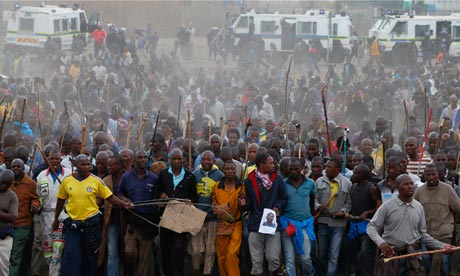Patrick Bond
South Africa: Politics, profits and policing after the Marikana Massacre

Lover of fast cars, vintage wine, trout fishing and game farming and the second richest black businessperson in South Africa (global financi
BRICS bloc’s rising ‘sub-imperialism’: the latest threat to people and planet?

President Dilma Rousseff of Brazil, Russian President Dimitry Medvedev, India
South Africa: What has Hurricane Sandy taught the ruling elite?

Storm surge from the cyclone in Durban, March 2007.
By Patrick Bond
South Africa's political economy after the Marikana massacre

Marikana miners protest against the August 16, 2012, massacre by police.
Washington in Africa, 2012: Who will Obama ‘whack’ next?

Graphic from the Economist.
By Patrick Bond
[Address to the Muslim Youth Movement 40th Anniversary Conference, University of KwaZulu-Natal, Durban, September 30, 2012. Posted at Links International Journal of Socialist Renewal with the author's permission.]
At a time when popular revolutions are sweeping the globe, the United States should be strengthening, not weakening, basic rules of law and principles of justice enumerated in the Universal Declaration of Human Rights. But instead of making the world safer, America’s violation of international human rights abets our enemies and alienates our friends. – Former US president Jimmy Carter, 25 June 2012, New York Times
South Africa: Dying for growth -- World Bank's role in Marikana massacre mine, carbon pollution

More than 3000 mineworkers take part in a march at Lonmin's Marikana mine in South Africa on September 5, 2012. Photograph by Mike Hutchings/REUTERS.
For more on the Marikana mine massacre, click HERE.
By Patrick Bond
September 5, 2012 -- Links International Journal of Socialist Renewal -- “One of the things you learn as an anthropologist, you don’t come in and change the culture”, Dartmouth College president Jim Yong Kim told wealthy alumni when contemplating the institution’s notorious hazing practices, prior to US President Barack Obama’s request last February that he move to the World Bank.
Kim’s Harvard doctorate and medical degree, his founding of the heroic NGO Partners in Health and his directorship of the World Health Organization’s AIDS division make him the best-educated, most humane World Bank president yet. A decade ago, he co-edited the book, Dying for Growth, pointing out that "Washington Consensus" policies and projects had a sharply adverse impact on health.
South Africa: Who will surf the protest wave?

Johannesburg's Orange Farm revolts against local elites.
By Patrick Bond
July 17, 2012 -- Links International Journal of Socialist Renewal -- The recent surge of unconnected community protests across South Africa confirms the country’s profound social, economic and environmental contradictions. But if activists fall before a new hail of police bullets, or if they lack an overarching, unifying political strategy, won’t their demonstrations simply pop up and quickly fall back down again – deserving the curse words "popcorn protests" – as they simply run out of steam, or worse, get channelled by opportunists into a new round of xenophobic attacks?
It’s been a hot winter, and we’re just halfway through July (the Centre for Civil Society’s Social Protest Observatory keeps tabs at http://ccs.ukzn.ac.za). Consider evidence from just the past two weeks, for example, in Johannesburg’s distant Orange Farm township south of Soweto, where residents rose up against city councillors and national electricity officials because of the unaffordable $250 installation charged for hated pre-payment (i.e. self-disconnection) meters, not to mention a 130% increase in electricity prices.
‘Closing the doors of learning’ to the Israeli state opens the doors of freedom

By Patrick Bond and Muhammed Desai
The contradictions of Ronnie Kasrils: The leftist spy who came in from cold Pretoria

Ronnie Kasrils speaks out against Israel's apartheid policies, March 5


